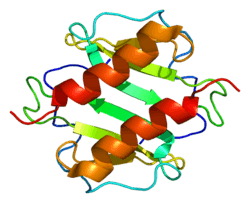CXCL1
| View/Edit Human | View/Edit Mouse |
The chemokine (C-X-C motif) ligand 1 (CXCL1) is a small cytokine belonging to the CXC chemokine family that was previously called GRO1 oncogene, GROα, KC, neutrophil-activating protein 3 (NAP-3) and melanoma growth stimulating activity, alpha (MSGA-α). In humans, this protein is encoded by the CXCL1 gene.[3]
Function
CXCL1 is secreted by human melanoma cells, has mitogenic properties and is implicated in melanoma pathogenesis.[4][5] CXCL1 is expressed by macrophages, neutrophils and epithelial cells,[6][7] and has neutrophil chemoattractant activity.[8][9] CXCL1 plays a role in spinal cord development by inhibiting the migration of oligodendrocyte precursors and is involved in the processes of angiogenesis, arteriogenesis, inflammation, wound healing, and tumorigenesis.[10][11][12][13][14] This chemokine elicits its effects by signaling through the chemokine receptor CXCR2.[10] The gene for CXCL1 is located on human chromosome 4 amongst genes for other CXC chemokines.[15] An initial study in mice showed evidence that CXCL1 decreased the severity of multiple sclerosis and may offer a neuro-protective function.[16]
References
- ↑ "Human PubMed Reference:".
- ↑ "Mouse PubMed Reference:".
- ↑ Haskill S, Peace A, Morris J, Sporn SA, Anisowicz A, Lee SW, Smith T, Martin G, Ralph P, Sager R (October 1990). "Identification of three related human GRO genes encoding cytokine functions". Proc. Natl. Acad. Sci. U.S.A. 87 (19): 7732–6. doi:10.1073/pnas.87.19.7732. PMC 54822
 . PMID 2217207.
. PMID 2217207. - ↑ Anisowicz A, Bardwell L, Sager R (October 1987). "Constitutive overexpression of a growth-regulated gene in transformed Chinese hamster and human cells". Proc. Natl. Acad. Sci. U.S.A. 84 (20): 7188–92. doi:10.1073/pnas.84.20.7188. PMC 299255
 . PMID 2890161.
. PMID 2890161. - ↑ Richmond A, Thomas HG (February 1988). "Melanoma growth stimulatory activity: isolation from human melanoma tumors and characterization of tissue distribution". J. Cell. Biochem. 36 (2): 185–98. doi:10.1002/jcb.240360209. PMID 3356754.
- ↑ Iida N, Grotendorst GR (October 1990). "Cloning and sequencing of a new gro transcript from activated human monocytes: expression in leukocytes and wound tissue". Mol. Cell. Biol. 10 (10): 5596–9. PMC 361282
 . PMID 2078213.
. PMID 2078213. - ↑ Becker S, Quay J, Koren HS, Haskill JS (March 1994). "Constitutive and stimulated MCP-1, GRO alpha, beta, and gamma expression in human airway epithelium and bronchoalveolar macrophages". Am. J. Physiol. 266 (3 Pt 1): L278–86. PMID 8166297.
- ↑ Moser B, Clark-Lewis I, Zwahlen R, Baggiolini M (May 1990). "Neutrophil-activating properties of the melanoma growth-stimulatory activity". J. Exp. Med. 171 (5): 1797–802. doi:10.1084/jem.171.5.1797. PMC 2187876
 . PMID 2185333.
. PMID 2185333. - ↑ Schumacher C, Clark-Lewis I, Baggiolini M, Moser B (November 1992). "High- and low-affinity binding of GRO alpha and neutrophil-activating peptide 2 to interleukin 8 receptors on human neutrophils". Proc. Natl. Acad. Sci. U.S.A. 89 (21): 10542–6. doi:10.1073/pnas.89.21.10542. PMC 50375
 . PMID 1438244.
. PMID 1438244. - 1 2 Tsai HH, Frost E, To V, Robinson S, Ffrench-Constant C, Geertman R, Ransohoff RM, Miller RH (August 2002). "The chemokine receptor CXCR2 controls positioning of oligodendrocyte precursors in developing spinal cord by arresting their migration". Cell. 110 (3): 373–83. doi:10.1016/S0092-8674(02)00838-3. PMID 12176324.
- ↑ Vries MH, Wagenaar A, Verbruggen SE, Molin DG, Dijkgraaf I, Hackeng TH, Post MJ (April 2015). "CXCL1 promotes arteriogenesis through enhanced monocyte recruitment into the peri-collateral space". Angiogenesis. 18 (2): 163–71. doi:10.1007/s10456-014-9454-1. PMID 25490937.
- ↑ Devalaraja RM, Nanney LB, Du J, Qian Q, Yu Y, Devalaraja MN, Richmond A (August 2000). "Delayed wound healing in CXCR2 knockout mice". J. Invest. Dermatol. 115 (2): 234–44. doi:10.1046/j.1523-1747.2000.00034.x. PMC 2664868
 . PMID 10951241.
. PMID 10951241. - ↑ Haghnegahdar H, Du J, Wang D, Strieter RM, Burdick MD, Nanney LB, Cardwell N, Luan J, Shattuck-Brandt R, Richmond A (January 2000). "The tumorigenic and angiogenic effects of MGSA/GRO proteins in melanoma". J. Leukoc. Biol. 67 (1): 53–62. PMC 2669312
 . PMID 10647998.
. PMID 10647998. - ↑ Owen JD, Strieter R, Burdick M, Haghnegahdar H, Nanney L, Shattuck-Brandt R, Richmond A (September 1997). "Enhanced tumor-forming capacity for immortalized melanocytes expressing melanoma growth stimulatory activity/growth-regulated cytokine beta and gamma proteins". Int. J. Cancer. 73 (1): 94–103. doi:10.1002/(SICI)1097-0215(19970926)73:1<94::AID-IJC15>3.0.CO;2-5. PMID 9334815.
- ↑ Richmond A, Balentien E, Thomas HG, Flaggs G, Barton DE, Spiess J, Bordoni R, Francke U, Derynck R (July 1988). "Molecular characterization and chromosomal mapping of melanoma growth stimulatory activity, a growth factor structurally related to beta-thromboglobulin". EMBO J. 7 (7): 2025–33. PMC 454478
 . PMID 2970963.
. PMID 2970963. - ↑ Omari KM, Lutz SE, Santambrogio L, Lira SA, Raine CS (January 2009). "Neuroprotection and remyelination after autoimmune demyelination in mice that inducibly overexpress CXCL1". Am. J. Pathol. 174 (1): 164–76. doi:10.2353/ajpath.2009.080350. PMC 2631329
 . PMID 19095949.
. PMID 19095949.
